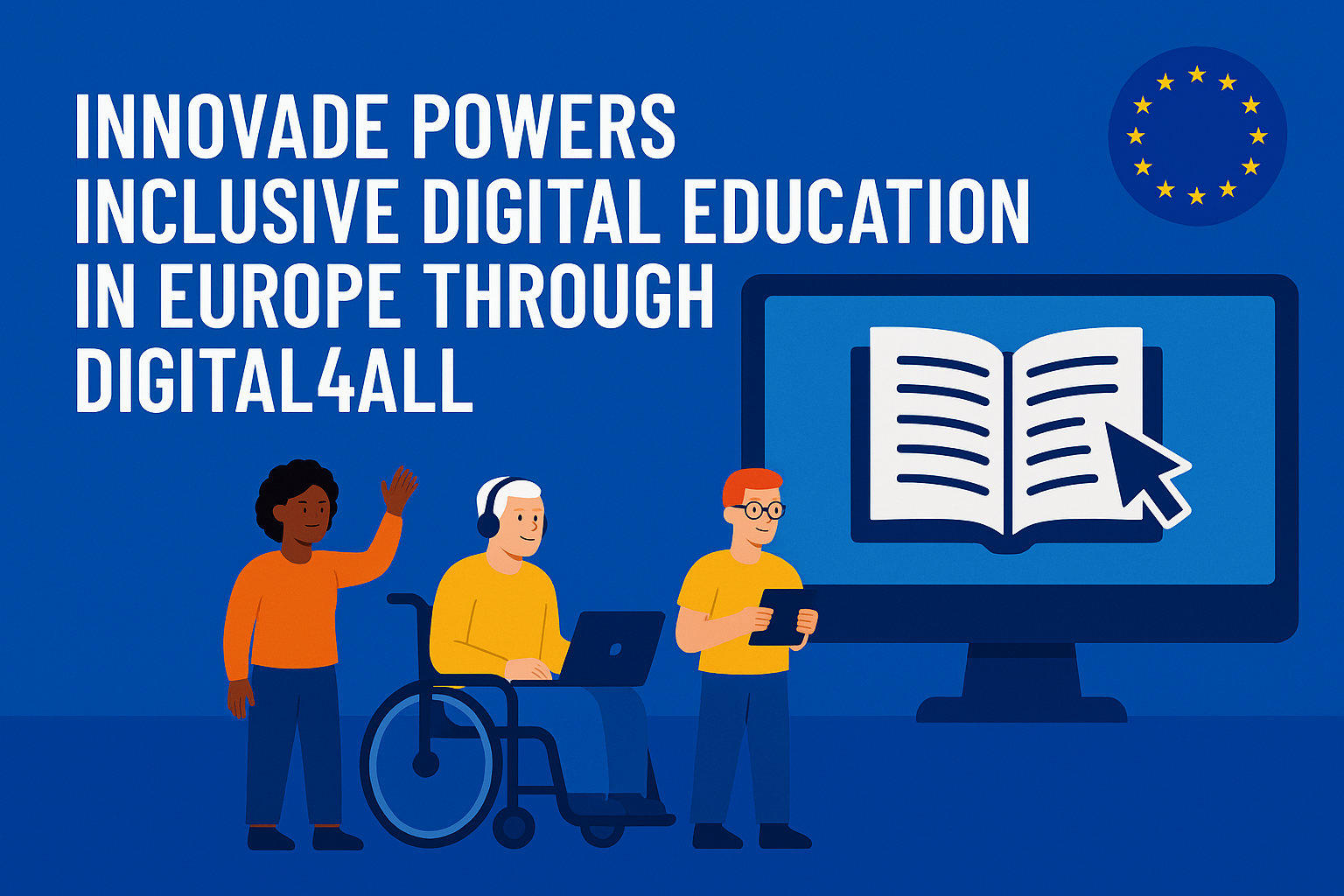
INNOVADE Powers Inclusive Digital Education in Europe through Digital4All
As the Digital4All project nears its successful completion this November, INNOVADE is proud to celebrate its pivotal role in developing and piloting groundbreaking tools that empower universities to make digital education inclusive for all.
Funded by the Erasmus+ Programme and led by Åbo Akademi University, Digital4All has supported higher education institutions across Europe to design and implement accessible digital learning environments that leave no learner behind.
Rethinking Access: How Higher Education Is Harnessing AI and Emerging Tech to Build Truly Inclusive Futures
As universities across Europe change into a new era of digital transformation, institutions are adopting cutting-edge solutions that redefine inclusion, not as an accommodation, but as an integral part of their operations from the start.
AI as an Inclusive Force
Leading campuses are deploying AI-powered tools—such as real-time speech-to-text, automated translation, and personalised content generation—to empower students with disabilities, multilingual students, and those from remote regions. One emerging platform, Audemy, leverages adaptive audio learning tailored to blind and visually impaired learners, modulating pacing and feedback based on real‑time interaction. These innovations demonstrate how AI can bridge the gap between access and achievement.
Immersive Tech Meets Universal Design
Universities are experimenting with AR/VR environments that adapt to individual learning profiles through assistive personalisation, and create virtual labs or simulations that accommodate diverse cognitive and mobility needs. Meanwhile, institutions guided by principles such as “Design for All in ICT” are embedding universal design into the architecture of their digital platforms, ensuring that variability in ability is accounted for from the very first click.
Open, Ethical, and Scalable Models
Organisations like the Inclusive Design Research Centre (IDRC) and initiatives such as AEGIS Europe are informing policy and technical standards, assisting institutions in building platforms that are inclusive by design, rather than reactive fixes. At the same time, newly emerging models, such as the German University of Digital Science, demonstrate how globally accessible, tuition-free, fully digital universities can broaden inclusion across socioeconomic and geographic lines.
The Rise of Living, Intelligent Curricula
Futurists envision degrees built as living curricula—micro‑credentials, modules, and adaptive pathways personalised for each learner. AI models now help students merge prior learning, work experience, and interests into custom journeys that respect their pace and context. The result? Increased participation among adult learners, refugees, regional students, and those returning to education later in life.
A Global Equity Imperative
According to OECD insights, inclusive digital transformations need more than tools—they require equity in access, different types of literacies, and platform design. As higher education systems implement these technologies, essential emerging priorities include rural broadband initiatives, low-bandwidth learning options, and open-access platforms that remove barriers for underserved communities.
For more information and to access the Digital4All Toolkit, training modules, and eLearning platform, please visit https://digital4allproject.eu/ and https://digital4allproject.eu/e-learning-platform/.
Sources:
- Accessibility in Higher Ed: Learn What You Need to Know, https://wcet.wiche.edu/frontiers/2025/03/21/accessibility-in-higher-ed-learn-what-you-need-to-know/?utm_source=chatgpt.com
- Digital equity and inclusion in education: An overview of practice and policy in OECD countries, https://one.oecd.org/document/EDU/WKP%282023%2914/en/pdf?utm_source=chatgpt.com
- AI-Driven Education can help the less privileged. https://www.theaustralian.com.au/subscribe/news/1/?sourceCode=TAWEB_WRE170_a_GGL&dest=https%3A%2F%2Fwww.theaustralian.com.au%2Fhigher-education%2Fai-can-help-close-the-equity-gap-which-afflicts-education%2Fnews-story%2F53781c5a7e6b73e3d327ba82236cb1d7&memtype=anonymous&mode=premium&v21=GROUPA-Segment-2-NOSCORE&V21spcbehaviour=append
- German University of Digital Science, https://en.wikipedia.org/wiki/German_University_of_Digital_Science?utm_source=chatgpt.com
- Inclusive Design Research Centre, https://en.wikipedia.org/wiki/Inclusive_Design_Research_Centre?utm_source=chatgpt.com
- Design for all, https://en.wikipedia.org/wiki/Design_for_All_%28in_ICT%29?utm_source=chatgpt.com
- The Future of AI in Higher Education: Innovation and Opportunity, https://www.linkedin.com/pulse/future-ai-higher-education-innovation-opportunity-david-massey-ksugc/
- AI for Accessible Education: Personalised Audio-Based Learning for Blind Students, https://arxiv.org/abs/2504.17117?utm_source=chatgpt.com
- AI in higher education: Empowering educators, enhancing learning and adapting for the future, https://verbit.ai/general/ai-in-higher-education-empowering-educators-enhancing-learning-and-adapting-for-the-future/?utm_source=chatgpt.com
